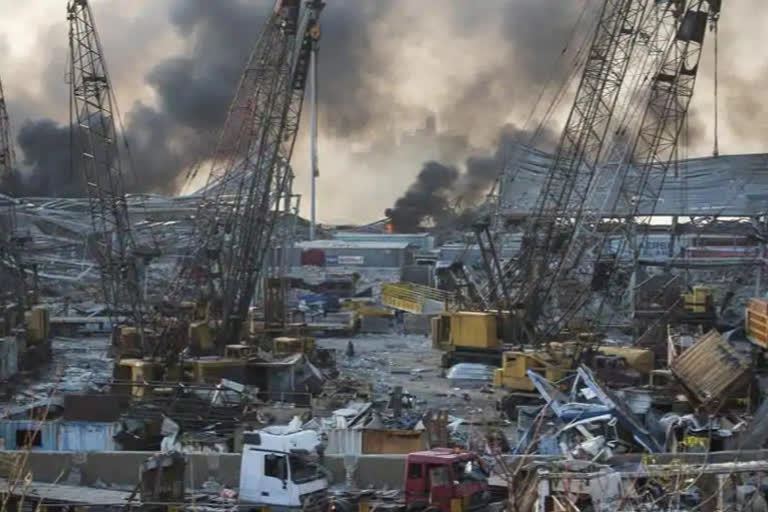Hyderabad: The exact cause behind the Beirut explosion is yet to be determined. However, Lebanese officials have linked the blasts to a stock of ammonium nitrate stored in the warehouse at the city's port.
As per legal documents, official statements and court correspondence - the stock of 2,750 tonnes landed in Beirut in 2013 and remained at the warehouse for over two years. Beirut is home to over two million people.
What is Ammonium Nitrate?
Ammonium nitrate is a white salt with oxidising properties. Due to this property, it is volatile and is easily fuelled by the oxygen. However, pure ammonium nitrate does not explode without a detonator and is hence considered safe to be used as an agricultural fertiliser. On the other hand, when mixed with carbon like fuel oil, it may lead to huge explosions, largely used for commercial explosions during mining.
Rules behind the use of Ammonium Nitrate:
• The manufacture, import, export, possession for sale or use of ammonium nitrate is covered under The Ammonium Nitrate Rules, 2012. The rules also make its storage in large quantities in populated areas illegal in India.
• Industrial licence for manufacture of ammonium nitrate is given under the Industrial Development and Regulation Act, 1951.
Major explosions due to Ammonium Nitrate in the past:
Accidents caused due to Ammonium nitrate are rare. But the fact that they are mostly stored in large quantities leads to huge explosions if they are caused.
• In 1921, an explosion at a chemical plant in Oppau, Germany made a crater over 60 feet deep.
• In 1947, an explosion in Texas triggered a 15 feet wave leaving hundreds of people dead.
• In 2001, an enormous explosion at a factory in Toulouse, France, shattered windows and apartments across the city.
• In 2015, ammonium nitrate explosions flattened parts of Tianjin, China and killing over 170 people and injuring hundreds.
How can it be regulated:
- Governments of several countries have imposed restrictions on the purchase and storage of ammonium nitrate after its use in terrorist bombings.
- Journalists and advocates in the US have presented over the insufficiency of regulations.
- In U.S. ports, Coast Guard monitors the storage of ammonium nitrate under the Espionage Act of 1917.
Indian states that still have Ammonium Nitrate:
- Andhra Pradesh: Concerns are being raised over the storage of large quantities of Ammonium Nitrate in Visakhapatnam. As per sources in the Customs department, neither the port nor container freight stations (CFS) have the compound in-store, but nine private warehouses have about 19,000 tonnes of it. It is transported to Chhattisgarh, Bihar, Odisha, Telangana and Maharashtra from Vizag.
- Tamil Nadu: As per a political party leader, the Chennai Port has over 700 tonnes of ammonium nitrate in store. Meanwhile, officials at the Chennai Port said that a large amount of the compound was confiscated in 2015 by the customs department, and has been lying there since then.
- Kerala: Several districts in the state have stocks of Ammonium Nitrate amounting between 5,000 and 35,000 kilograms. The Petroleum and Explosives Safety Organisation (PESO) granted 17 licenses in Kerala permitting the use of Ammonium Nitrate.
- Telangana: Hyderabad Police raided a storage facility and recovered a huge amount of illegal Ammonium Nitrate in October 2019. The owner of the facility had a license for the storage capacity of 400 Metric ton, was apprehended for keeping more than the permissible limit.
- Rajasthan: 20 tonnes of ammonium nitrate has been lying at Baitu police station of Barmer district in Rajasthan for over 4 years.
- Odisha: In January 2020, 196 quintals of illegally stored ammonium nitrate, 3,200 gelatin sticks and 10,406 detonators had been seized from a storehouse at Gopalpur village of Ganjam district by the Special Task Force (STF).
- Jharkhand: In August 2018, a huge cache of explosive materials, including ammonium nitrate was unearthed by police at Shahpur village in Pakur district.



